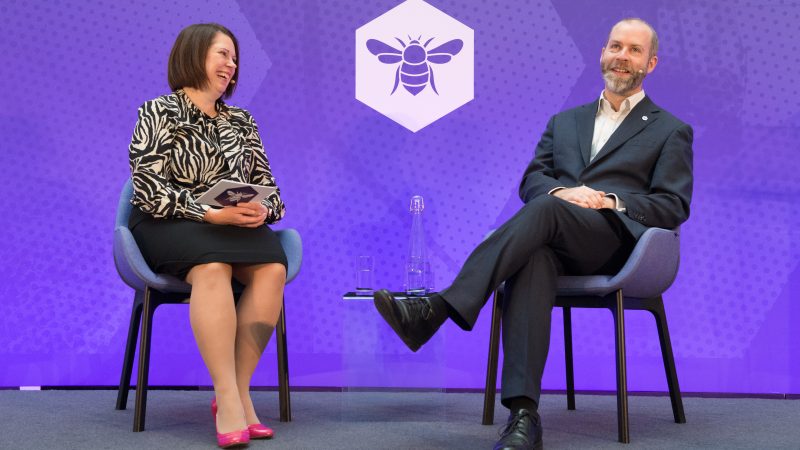
The Co-operative Party feels itself to be ascendant. That much was clear at their showcase event last weekend.
On the numbers, they would certainly seem to be: they have more MPs and cabinet ministers than ever before, and, as was mentioned more than once in the course of the day, one in 4 Labour representatives also wear a Co-operative rosette.
At the Co-op Group’s headquarters in Angel Square in Manchester (also the site of Labour’s manifesto launch this summer), supporters and staff were addressed by a range of politicians, starting off with Business Secretary Jonathan Reynolds – as a Labour and Co-op MP, he is the first ever Co-operative Business Secretary – and with keynotes in the afternoon from Angela Rayner (the only, by my estimation, non-Co-op politician to speak) and Greater Manchester Mayor Andy Burnham.
READ MORE: ‘There’s an appetite, fundamentally, for our type of ideas’: The Co-operative Party has plans for government’
One point acknowledged by several speakers, including Burnham (one of the Co-operative Party’s eight metro mayors), was the party’s failure to get all they could from the last Labour government. Keir Starmer’s Labour appears significantly more interested in alternative forms of ownership than the party was in the New Labour years, an instinct demonstrated by the manifesto commitment to doubling the co-operative economy.
Having secured this commitment the party are now clearly looking to their next step, which would seem to be pitching their community ownership agenda as a solution to the problems of trust, populism and cohesion illustrated so vividly this summer by Reform’s extremely good election results and the far-right riots which followed the stabbings in Southport.
Reynolds takes to the stage and heralds "the co-operative movement is one of this country's most important social movements". His area was "cooperative before it was Labour", he says. pic.twitter.com/AoG9gUhSyI
— LabourList (@LabourList) October 12, 2024
The potential role of local ownership in rebuilding social trust in communities was highlighted by Peterborough MP Andrew Pakes in the showcase’s morning session with new MPs.
“I think too many people have lost faith in democracy”, said Pakes, who has been a Co-operative Party member since he was 15. “Too many people don’t think politicians can make a difference because their lived experience of politicians the last 14 years has been they lie.
“I genuinely believe if Labour wants to transform this country, co-operative values must be at the heart of that, because we restore trust in people, for people, by giving them control and agency over their own lives. We rebuild our economy, we rebuild our democracy, by having people taking real charge.”
Later, Rayner touched on similar themes, discussing how spaces vandalised by rioters were rebuilt by communities, before saying that in future “we hope that far more of those spaces will be community-owned, and that any community who wants to run an asset for the community has the best possible chance to do it.”
READ MORE: Select committee elections unpacked: More than 100 new Labour MPs win roles
Rayner also made a broader argument about the capacity of co-operative policies to cement long term change: “Once we give communities that power, it can’t just be taken away….at its heart, community ownership brings people together. Communities who own things are more connected, they share responsibility for the most important assets. They make decisions together, they are rooted in their local places.”
Meanwhile on Thursday this week, another Labour and Co-op MP Gareth Snell described community ownership as an “answer” to the riots, writing: “The work must now begin to seize that pride and build communities that are powerful and resilient…Now is the moment to take it seriously as a tool for building cohesion in the wake of this watershed moment.”
Labour’s sister party has sometimes, it’s fair to say, struggled somewhat to be taken seriously, but with the boost of a meaningful manifesto pledge and ministers throughout government evangelising for the co-op cause, as new Co-op MP Emma Foody, formerly assistant general secretary, advised other Co-op MPs to do.
The party is now looking to position themselves as the people with the answers on how Labour builds trust in local communities. Whether they pull it off remains to be seen, but if Saturday is anything to go by, they are certainly feeling confident.




More from LabourList
‘Unity or division’: Starmer’s message to voters in Gorton and Denton
Almost half of Labour members oppose plans to restrict jury trials, poll finds
‘How Labour can finally fix Britain’s 5G problem’